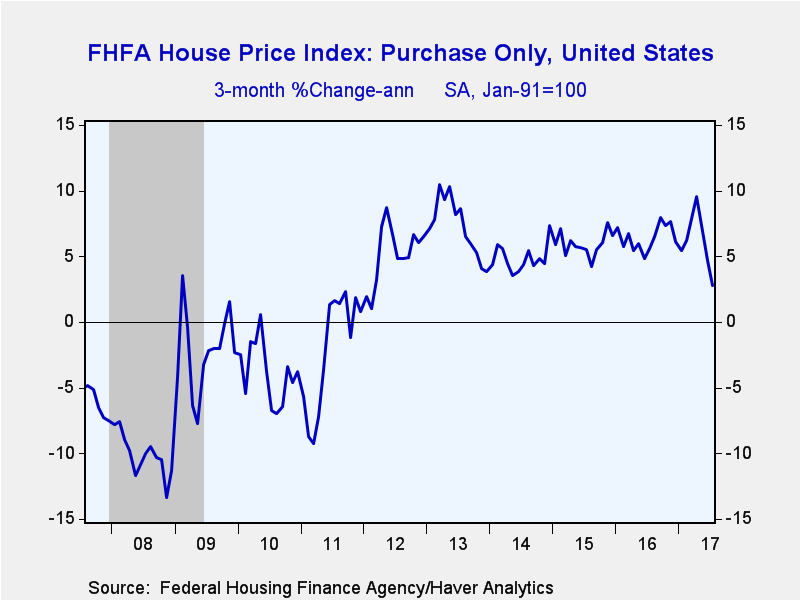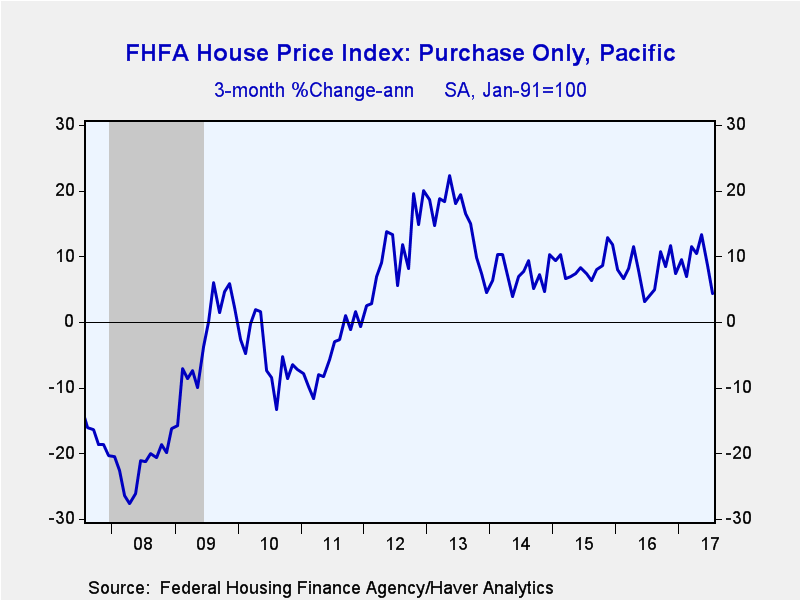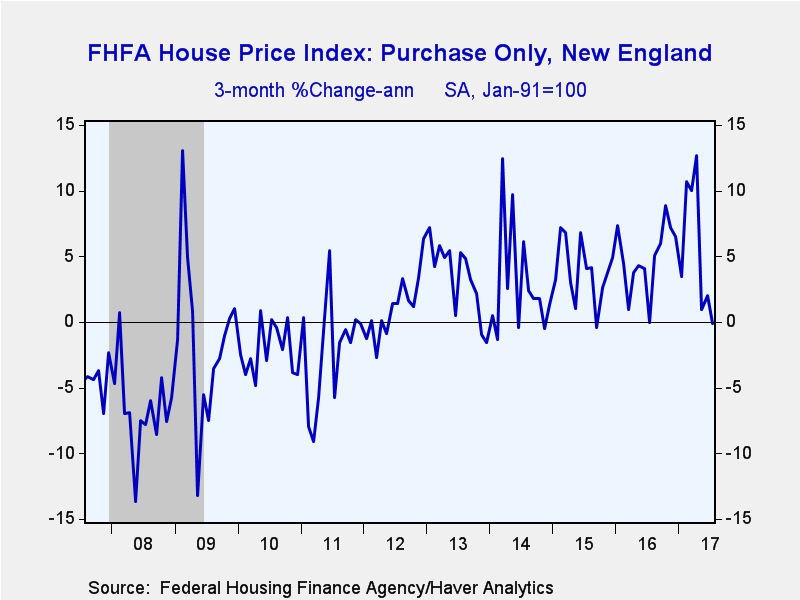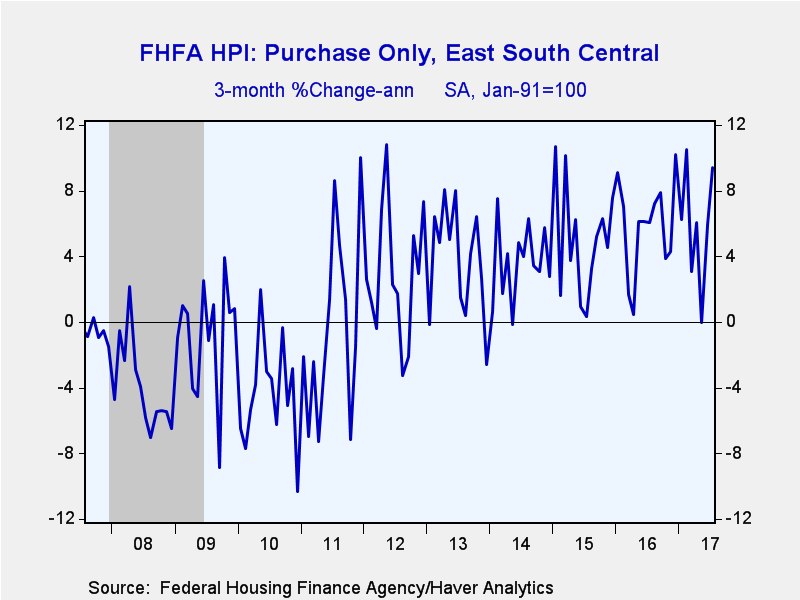 Global| Sep 21 2017
Global| Sep 21 2017U.S. FHFA House Price Increases Moderate
by:Tom Moeller
|in:Economy in Brief
Summary
The Federal Housing Finance Agency's (FHFA) index of U.S. house prices rose 6.3% y/y during July compared to a peak 7.0% y/y gain in April. Recent figures show an even sharper deceleration in house price inflation. During the last [...]
The Federal Housing Finance Agency's (FHFA) index of U.S. house prices rose 6.3% y/y during July compared to a peak 7.0% y/y gain in April. Recent figures show an even sharper deceleration in house price inflation. During the last three months, prices improved at a slow 2.8% annual rate. In July, prices rose 0.2% following a 0.1% June uptick. These gains compared to monthly increases in the range of 0.4%-to-0.9% during the prior four months.
The performance of home prices continued to vary greatly around the country. On the strong side were the Pacific and Mountain regions where prices rose 8.2% y/y. Over the last three months, however, prices rose at 3.4%-to-4.4% annual rates.
These strong y/y gains were followed by the South Atlantic, East South Central, New England and East South Central regions where prices rose roughly 6.0% y/y. Recently, however, gains have slowed sharply.
Slower house price inflation occurred amongst states in Middle Atlantic region where prices rose 4.4% y/y. The rate of gain during the last three months declined more sharply to 1.4%. In the West North Central region, prices rose 4.2% y/y and at a 1.7% rate in the last three months.
In New England, home prices have not risen on average during the last three months, and in the South Atlantic & East North Central states, gains have slowed markedly to 1.0% to 3.0%.
An exception to the slowdown story is the East South Central region where home price inflation remained a firm 9.4% during the last three months.
The FHFA house price index is a weighted repeat sales index, measuring average price changes in repeat sales of the same property. An associated quarterly index also includes refinancings on the same kinds of properties. The indexes are based on transactions involving conforming, conventional mortgages purchased or securitized by Fannie Mae or Freddie Mac. Only mortgage transactions on single-family properties are included. The FHFA data are available in Haver's USECON database.
| FHFA U.S. House Price Index, Purchase Only (SA %) |
Jul | Jun | May | Jul Y/Y | 2016 | 2015 | 2014 |
|---|---|---|---|---|---|---|---|
| Total | 0.2 | 0.1 | 0.4 | 6.3 | 6.2 | 5.6 | 5.4 |
| Pacific | -0.5 | 0.4 | 1.1 | 8.2 | 8.1 | 8.0 | 9.4 |
| Mountain | 0.3 | 0.3 | 0.3 | 8.2 | 8.0 | 7.9 | 7.2 |
| South Atlantic | 0.4 | -0.0 | 0.1 | 6.6 | 7.2 | 6.5 | 5.8 |
| East South Central | 0.5 | 1.2 | 0.6 | 6.4 | 5.3 | 4.8 | 3.5 |
| New England | 0.2 | 0.3 | -0.5 | 6.1 | 4.0 | 3.6 | 3.1 |
| East North Central | 0.6 | -0.0 | 0.2 | 5.9 | 5.4 | 4.5 | 4.5 |
| West South Central | -0.0 | -0.6 | 1.0 | 5.5 | 6.1 | 6.4 | 5.6 |
| Middle Atlantic | 0.5 | 0.4 | -0.5 | 4.4 | 3.6 | 2.7 | 2.2 |
| West North Central | -0.5 | 0.2 | 0.7 | 4.2 | 5.7 | 4.3 | 4.1 |
|
Mountain: Montana, Idaho, Wyoming, Nevada, Utah,
Colorado, Arizona and New Mexico. |
Tom Moeller
AuthorMore in Author Profile »Prior to joining Haver Analytics in 2000, Mr. Moeller worked as the Economist at Chancellor Capital Management from 1985 to 1999. There, he developed comprehensive economic forecasts and interpreted economic data for equity and fixed income portfolio managers. Also at Chancellor, Mr. Moeller worked as an equity analyst and was responsible for researching and rating companies in the economically sensitive automobile and housing industries for investment in Chancellor’s equity portfolio. Prior to joining Chancellor, Mr. Moeller was an Economist at Citibank from 1979 to 1984. He also analyzed pricing behavior in the metals industry for the Council on Wage and Price Stability in Washington, D.C. In 1999, Mr. Moeller received the award for most accurate forecast from the Forecasters' Club of New York. From 1990 to 1992 he was President of the New York Association for Business Economists. Mr. Moeller earned an M.B.A. in Finance from Fordham University, where he graduated in 1987. He holds a Bachelor of Arts in Economics from George Washington University.










